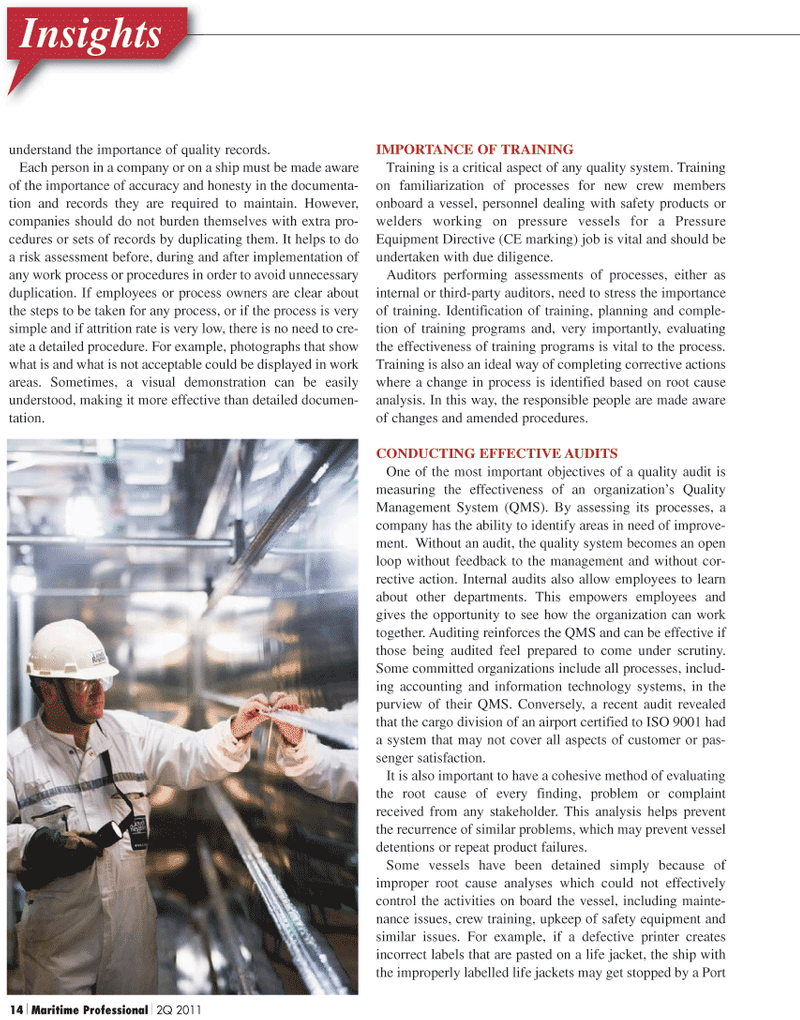
Page 14: of Maritime Logistics Professional Magazine (Q2 2011)
Energy Transportation
Read this page in Pdf, Flash or Html5 edition of Q2 2011 Maritime Logistics Professional Magazine
14 Maritime Professional 2Q 2011 understand the importance of quality records.
Each person in a company or on a ship must be made aware of the importance of accuracy and honesty in the documenta- tion and records they are required to maintain. However, companies should do not burden themselves with extra pro- cedures or sets of records by duplicating them. It helps to do a risk assessment before, during and after implementation of any work process or procedures in order to avoid unnecessary duplication. If employees or process owners are clear about the steps to be taken for any process, or if the process is very simple and if attrition rate is very low, there is no need to cre- ate a detailed procedure. For example, photographs that show what is and what is not acceptable could be displayed in work areas. Sometimes, a visual demonstration can be easily understood, making it more effective than detailed documen- tation.
IMPORTANCE OF TRAINING
Training is a critical aspect of any quality system. Training on familiarization of processes for new crew members onboard a vessel, personnel dealing with safety products or welders working on pressure vessels for a Pressure
Equipment Directive (CE marking) job is vital and should be undertaken with due diligence.
Auditors performing assessments of processes, either as internal or third-party auditors, need to stress the importance of training. Identification of training, planning and comple- tion of training programs and, very importantly, evaluating the effectiveness of training programs is vital to the process.
Training is also an ideal way of completing corrective actions where a change in process is identified based on root cause analysis. In this way, the responsible people are made aware of changes and amended procedures.
CONDUCTING EFFECTIVE AUDITS
One of the most important objectives of a quality audit is measuring the effectiveness of an organization’s Quality
Management System (QMS). By assessing its processes, a company has the ability to identify areas in need of improve- ment. Without an audit, the quality system becomes an open loop without feedback to the management and without cor- rective action. Internal audits also allow employees to learn about other departments. This empowers employees and gives the opportunity to see how the organization can work together. Auditing reinforces the QMS and can be effective if those being audited feel prepared to come under scrutiny.
Some committed organizations include all processes, includ- ing accounting and information technology systems, in the purview of their QMS. Conversely, a recent audit revealed that the cargo division of an airport certified to ISO 9001 had a system that may not cover all aspects of customer or pas- senger satisfaction.
It is also important to have a cohesive method of evaluating the root cause of every finding, problem or complaint received from any stakeholder. This analysis helps prevent the recurrence of similar problems, which may prevent vessel detentions or repeat product failures.
Some vessels have been detained simply because of improper root cause analyses which could not effectively control the activities on board the vessel, including mainte- nance issues, crew training, upkeep of safety equipment and similar issues. For example, if a defective printer creates incorrect labels that are pasted on a life jacket, the ship with the improperly labelled life jackets may get stopped by a Port
Insights

 13
13

 15
15
